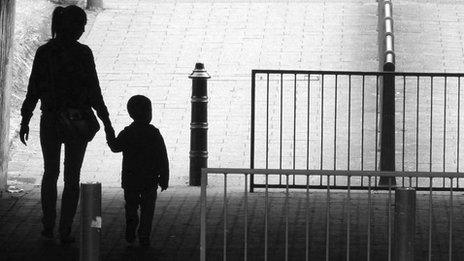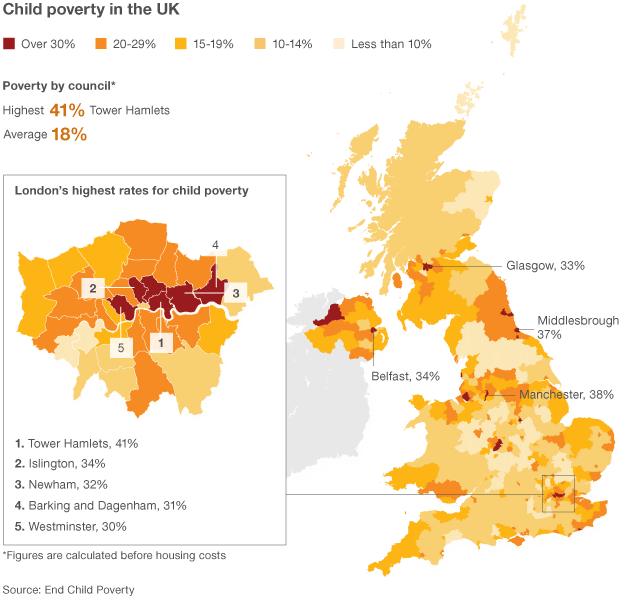Child poverty strategy to be unveiled later this week
- Published

The most recent government figurers showed 17% of UK children were in poverty
The government is to unveil a new strategy to tackle child poverty on Thursday, the BBC has learned.
Work and Pensions Secretary Iain Duncan Smith would also like to announce a new definition of what constitutes child poverty, but that could be vetoed by his colleagues in the Treasury.
Currently, a child is said to be living in poverty if their household income is less than 60% of the average wage.
But Mr Duncan Smith wants factors other than income to be taken into account.
A Downing Street spokesman said the government was obliged to regularly update its strategy on child poverty and the latest review "would be published shortly".
Some details of the draft measures to be put forward by Mr Duncan Smith and schools minister David Laws to try to end child poverty were reported by the Observer, external.
They include reducing the typical energy bill by £50 and extending the warm home discount, reducing water bills for low-income families, and lowering food bills through vouchers and extending the free school meals programme.
Treasury 'sceptical'
Mr Duncan Smith has said that the income method of measuring poverty is too simple and the government has been consulting on whether the definition should be altered.
He believes some families might appear to have become less poor simply because average incomes have fallen.
Life is unchanged for those children, he has argued, and a broader definition of child poverty with factors such as whether children have access to a good education, a decent home and stable family should be included.

BBC political correspondent Iain Watson says the Treasury remains sceptical and could block any changes, wary that the government's opponents could accuse them of massaging child poverty figures.
In October, the government's social mobility tsar Alan Milburn warned that working parents in Britain "simply do not earn enough to escape poverty".
'Rise in poverty'
In its first report, the government's Social Mobility and Child Poverty Commission warned the target of ending child poverty by 2020 would "in all likelihood be missed by a considerable margin" - leaving as many as two million children in poverty.
Government figures on poverty, released in June, show the median UK household income for 2011/2012 was £427 a week - 60% of that figure was £256 a week.
In that year, 17% of children, or 2.3 million, were classed as being in poverty while 15% of working-age adults, or 5.6 million, were in poverty.
But Labour said 400,000 more children were set to be living in poverty in 2015, compared with five years earlier.
"For the first time since records began, there are more people in poverty who are working than who are out of work," said shadow work and pensions secretary Rachel Reeves.
"Changing the definition of poverty won't do anything to help the children whose lives are being damaged by the rise in poverty we are seeing under this government."
- Published8 December 2013
- Published17 October 2013
- Published17 October 2013